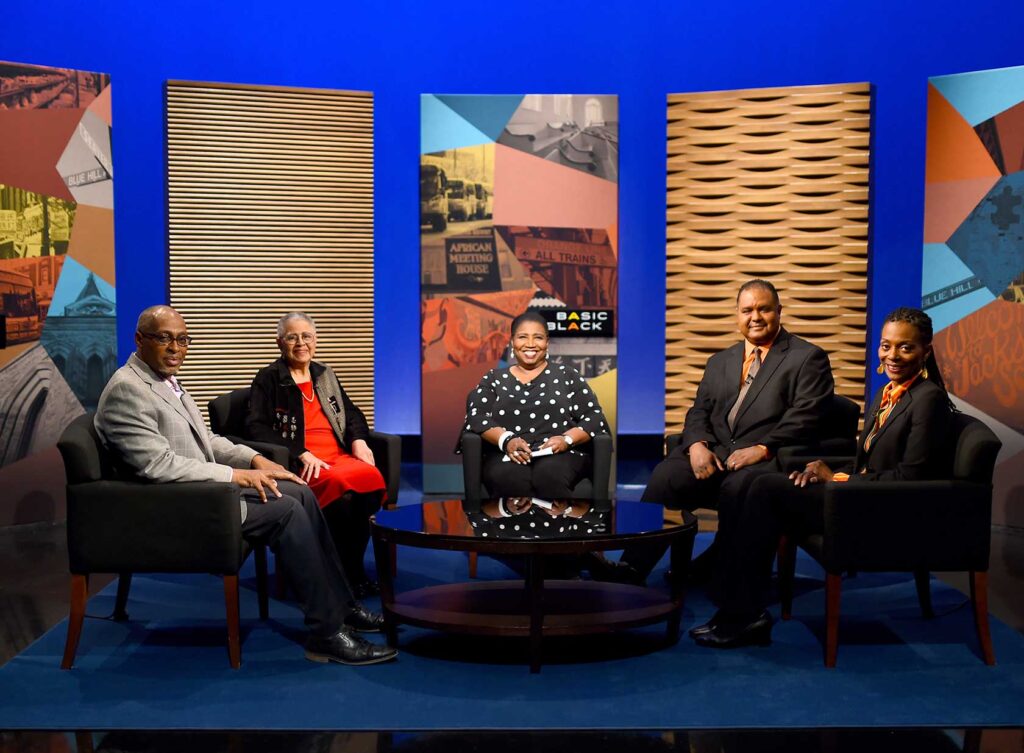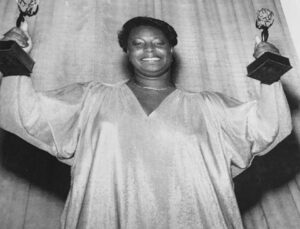GBH drops ‘Basic Black’
Move prompts strong pushback from staff and viewers

When WGBH launched “Say Brother” in July 1968 — three months after the assassination of Rev. Martin Luther King Jr. — the nation’s first public TV show geared towards people of color quickly found an audience.
The show was a prime-time forum for discussions of poverty, civil rights, unequal education, urban renewal and the rise of Black Power produced and delivered by Black journalists. Many, like the late WBZ reporter Sarah-Ann Shaw, went on to launch long and successful careers in the broadcast industry.
But close to six decades after first airing, the pioneering program — in the form of its renamed successor, “Basic Black” — is being pulled from the airwaves. It is the last in a long line of cutbacks to the civil rights remnant. Its backers aren’t thrilled.
GBH announced the move last Thursday in a broader shake-up while attributing the show’s end to budget shortfalls and weak viewership. The show’s staff, Executive Producer Delores Edwards and an assistant, were laid off along with 29 others. The audience for “Basic Black,” said GBH spokesperson Erin Callanan, averaged 2,900 a week.
The show will return digitally distributed in a new format to appeal to an online audience, according to GBH executive editor Lee Hill, who insisted that digital platforms need not be inferior to television.
“Basic Black,” he said, will “be produced in a more digitally native way for more people online.” Hill compared the approach to the advantages that podcasts have over traditional radio programming. He said some segments may air on Channel 2.
Hill, who’s worked in public media for 21 years, said GBH is “doubling down” on “issues that are pertinent to Black and brown communities.” The station, he said, is already in the process of hiring staff for an equity-reporting unit funded by a Barr Foundation grant.
But a number of alumni of the program aren’t buying the station’s argument.
Tonia Magras, a former producer, blasted the decision while tracing “an iterative downsizing” of the show since its launch on a Thursday evening prime-time slot. The cancellation, she said, mirrors the diminishment of broadcast programming in Boston aimed at audiences of color.

Barbara Barrow-Murray holds her two Emmy Awards for “Say Brother.” PHOTO: COURTESY BARBARA BARROW-MURRAY
That includes the demise of WILD radio and such Boston-based network affiliate programs as “Urban Update” and “La Plaza.” “Cityline” on WCVB remains as a stalwart urban affairs show in the Boston media market.
Programming “like ‘Basic Black’ is needed now more than ever,” she said. “We’re in a very divisive world.”
Robin Washington, another former producer, questioned the insensitive timing of the show’s demise. “To announce the cancellation of the show not even two months … after Sarah-Ann Shaw’s memorial is just appalling,” said Washington, who acknowledged the need for programming to deliver audience metrics.
But he felt “Basic Black” was doing so. “It is staying relevant, and it does have an audience,” he said.
Carmen Fields, a former office of the National Association of Black Journalists and a one-time co-anchor of WGBH’s news show, said the show would be missed for its departure from the typical portrayal of Black people in media stereotypes. “You could at least count on ‘Say Brother’ to sensitively air our concerns,” said Fields, whose master’s degree thesis at Boston University charted the history of “Say Brother.”
Fields added that non-Black households tuned into the show to hear “the way Black people were talking about issues in our homes or around the dinner table.”
Marjorie Egan echoed that sentiment last week on her GBH Boston Public Radio with Callie Crossley, a longtime “Basic Black” host. Egan said she tuned in just to hear how “Basic Black” was talking about issues.
Crossley, who stepped back from hosting last October, touted the topical variety of “Basic Black.” Sympathizing with former coworkers, Crossley said, “It’s been a very difficult week here at GBH.”
Tanisha Sullivan, president of the Boston NAACP and a member of GBH’s board of advisers, said she was disappointed by the announcement but hopeful for the show’s reboot. “Basic Black,” she added, has the potential to speak to “the heartbeat of our nation as a means to really measure our progress.”
Public media, she said, “has a very important role to play in American society.”
Michael Curry, Sullivan’s predecessor at the Boston NAACP, also serves on GBH’s board of advisers. He said “Basic Black” was often at risk of cuts in programming dollars and listed multiple instances of advocates saving it from the chopping block. “If you don’t have people watching, there’s a cost associated with every program,” he said.
Former producer Howard Manly, a veteran of the Boston Globe and the Bay State Banner, questioned rating methodologies used to determine viewership. “Nielsen boxes were never in the zip codes where most Black folks live,” he said.
Plus, “Basic Black” meant more to its audience than other programs. “Unmeasurables were very significant,” said Manly. Black people “took pride in seeing us on TV.” He was not hopeful about a return to the airwaves. “The new reality is that it’s going to be a digital show,” he said.
Colin “Topper” Carew, a former producer who left Boston for a successful filmmaking career in Los Angeles, argued that “Basic Black” should remain on the air. For Black communities, “the habit is not one of streaming,” he said, noting the show “didn’t even have a goodbye.”
In its earliest years, the show tried to answer the exclusion felt by marginalized people who lacked any voice to communicate their feelings, lives, desires and demands, said Jim Boyd, an early producer who went on to anchor WCVB’s midday news broadcasts.
Management wanted a Black-produced program but needed to hire more Black staff. Boyd was one of the few, thanks to a one-year fellowship from National Educational Television, PBS’s antecedent.
After a few months, Ray Richardson, then 23 and a recent Boston University film-school graduate, took over. The fireworks soon began.
“Say Brother” packaged news and discussion. Bryant Rollins, a former Boston Globe reporter and Bay State Banner editor, offered commentary. Jim Spruill, a BU grad student and actor, hosted. Stewart Thomas featured youth issues. Stan Lathan, another BU grad student, was the original director.
Sarah-Ann Shaw was a standout reporter. Her “legend was born right there,” said Carmen Fields. The Globe later termed her “militant.”
Rollins provoked the Boston School Committee chairman by calling for a boycott of the city’s segregated schools. WGBH’s Michael Rice offered the chair an opportunity to reply, but not on “Say Brother.” Richardson, protective of their editorial line, clashed with station management.
In 1970, Richardson wore out his welcome over the late FCC-mandated fairness doctrine, requiring broadcast entities to offer equal time to opposing views on political issues. The show was canceled. Future Boston City Councilor Chuck Turner led a futile boycott for Richardson’s reinstatement. But the producer never returned. He drowned in Mexico months later.
After WGBH agreed to a permanent community committee that would hold hearings on staffing matters, “Say Brother” relaunched in July 1971.
In 1973, Carew was recruited by the late Boston uber-activist Mel King to produce the show. Though he found it floundering, Carew revived it in the next four years.
King and Turner sat on the community committee. The outside group was protective of “Say Brother,” which Carew called “a pioneering venture relative to the overall tapestry of WGBH.”
Carew’s vision elevated cultural and historical content, along with entertainment and news. As producer Carew enjoyed “editorial independence.” Black consciousness united people across class divides, he said. “Brotherhood and sisterhood,” he recalled, “arms locking together.”
Working for “Basic Black” didn’t deliver the same salaries as prominent national programs. But production staff understood their show was part of WGBH’s mission, said Magras.
Black cultural groups and community leaders linked with WGBH, she said. “It was all connected.”
Magras’s mother, Cynthia Johnson, was the producer who rebranded the show as “Basic Black” in 1997. Magras said “Say Brother” evoked the 1960s and 70s and that the name change continued the legacy but brought the show “into its new rightful space.”
Johnson told The Banner that “Say Brother” left out women. She said “Basic Black” encompassed the program’s for-us, by-us core values. It referenced a feminist novel, “Basic Black with Pearls,” first published in 1980. The rebrand, she said, modestly gestured toward formality and elegance.
Lynn DuVal-Luse worked as a producer during the rebrand, which she said closely followed contemplated cutbacks to the show. She was opposed to the name change, saying she feared it would compromise “Say Brother’s” legacy. “You lose some of the history,” she said.
DuVal-Luse said that changes were not limited to the name. “Say Brother’s” community committee was disbanded, and the show stopped sending crews out to gather news.
The surviving in-studio discussion format lacked the dynamism of the richer content from earlier decades and viewership declined. The downward spiral, also fed by audiences switching to on-line news, led to the decision last week to shut down the broadcast, ending its 56-year run.






